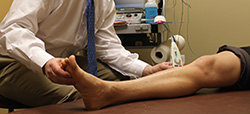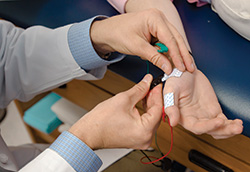-
Board-Certified
Fellowship-Trained
Physical Medicine
& Rehabilitation
EMG Diagnostic
 At South Carolina Spine Center, Dr. Mathew Gowans specializes in the non-surgical treatment of back and neck pain. During your physician visit at South Carolina Spine Center, the spine specialist may recommend a diagnostic test called an EMG to determine what may be causing your back or neck symptoms, including radiating pain, weakness or numbness in a leg or arm. Dr. Gowans is the specialist who performs EMG tests at South Carolina Spine Center.
At South Carolina Spine Center, Dr. Mathew Gowans specializes in the non-surgical treatment of back and neck pain. During your physician visit at South Carolina Spine Center, the spine specialist may recommend a diagnostic test called an EMG to determine what may be causing your back or neck symptoms, including radiating pain, weakness or numbness in a leg or arm. Dr. Gowans is the specialist who performs EMG tests at South Carolina Spine Center.
What is an EMG?
In order to diagnosis your condition, South Carolina Spine Center will gather patient history information and perform a physical exam. Your physician may also order tests to record and analyze electrical impulses between muscles and nerves. These tests are used to diagnose, evaluate and treat neuromuscular, musculoskeletal, and nervous system symptoms. EMG stands for Electromyography. This EMG diagnostic test can provide your doctor with important information about how a herniated disc can be impinging upon a nerve route and causing nerve or muscle problems. An EMG diagnostic test can also determine the exact location of the nerve disruption and give some indication whether the damage is reversible.
 An EMG may be ordered for patients who experience numbness, tingling, pain, weakness, or muscle cramping. Nerve Conduction Studies (NCS diagnostic test) and EMGs are types of tests that the spine physician may use to diagnose symptoms. Conditions that EMG testing helps diagnose include a pinched nerve, radiculopathy, sciatica, muscle diseases, muscular dystrophy and many others.
An EMG may be ordered for patients who experience numbness, tingling, pain, weakness, or muscle cramping. Nerve Conduction Studies (NCS diagnostic test) and EMGs are types of tests that the spine physician may use to diagnose symptoms. Conditions that EMG testing helps diagnose include a pinched nerve, radiculopathy, sciatica, muscle diseases, muscular dystrophy and many others.
What will a Nerve Conduction Study reveal?
A Nerve Conduction Study can show your spine specialist how well the body’s electrical signals are traveling to a nerve. During this test, small electrical shocks are applied to the nerve in order to record how the nerve works. The shocks may cause a quick, mild and tingling feeling. The doctor may test several nerves.
My doctor ordered an EMG. What does this involve?
 During an EMG, a small, acupuncture size needle is placed in several muscles to help diagnosis a back or neck condition. There may be a bit of discomfort when the needle is inserted. The physiatrist will only test the muscles necessary for diagnosis. Physicians are able to see and hear the electrical signals that travel from the needle to the EMG machine.
During an EMG, a small, acupuncture size needle is placed in several muscles to help diagnosis a back or neck condition. There may be a bit of discomfort when the needle is inserted. The physiatrist will only test the muscles necessary for diagnosis. Physicians are able to see and hear the electrical signals that travel from the needle to the EMG machine.
How long will an EMG / Nerve Conduction Study take?
EMG testing usually takes anywhere from 30 to 90 minutes, depending on the condition being tested and findings of the study. Patients can do normal activities, like eating, driving, and exercising, before and after the tests.
Why is an EMG or NCS an important test?
An EMG or Nerve Conduction Study is crucial to determining if spine surgery is necessary, and what disc level is the true source of symptoms. It can also determine if a nerve impingement is causing lifelong problems if left untreated. So while there may be some discomfort related to the diagnostic test, it is designed to improve the success of any surgery that may be needed.
Physician Biographies
-
 Karl Boellert, MD
Karl Boellert, MD -
 Mathew Gowans, MD
Mathew Gowans, MD- Board-Certified
Physical Medicine
& Rehabilitation
- Board-Certified
-
 Michael P.B. Kilburn, MD
Michael P.B. Kilburn, MD-
Board-Certified
Fellowship-Trained
Spinal Neurosurgeon
-
Board-Certified
-
 Sumeer Lal, MD
Sumeer Lal, MD-
Board-Certified
Fellowship-Trained
Spinal Neurosurgeon
-
Board-Certified
-
 John Cole, MD
John Cole, MD-
Board-Certified
Fellowship-Trained
Spinal Neurosurgeon
-
Board-Certified
Back to Life Journal

Home Remedy Book

![]() Website Design & Educational Content © Copyright 2023 Prizm Development, Inc.
Developing Centers of Excellence for Better Healthcare.
Website Design & Educational Content © Copyright 2023 Prizm Development, Inc.
Developing Centers of Excellence for Better Healthcare.
Prizm is the most experienced developer of spine and orthopedic centers in the U.S. with content-rich educational web sites for physicians.
